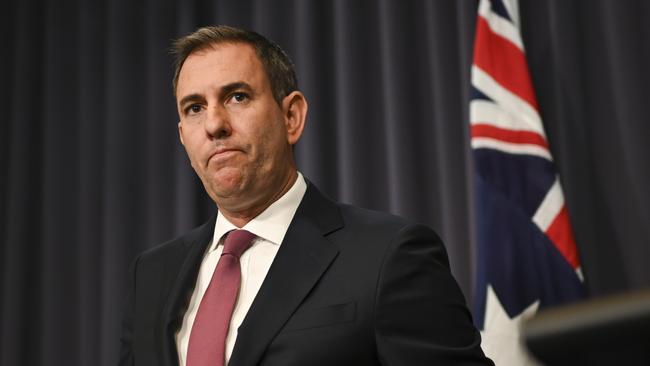FOI reveals CBA failed to tell APRA, ASIC over cash cost crunch
Searches at ASIC and APRA have shown no record of CBA telling the regulators it was preparing to push customers to accounts requiring them to pay $3 to access cash at branches.

Commonwealth Bank failed to formally notify either of Australia’s peak financial regulators before ramming through moves to shift one million customers to new bank accounts in which many would pay to access cash through branches.
Freedom of Information requests show both the corporate regulator and the prudential regulator have no record of any approach from CBA in 2024 over the issue.
In response to requests from The Australian, lawyers for The Australian Securities and Investments Commission, which regulates the provision of financial services, revealed the agency had no documents relating to CBA’s cash access fee or its accounts migration move.
The Australian Prudential Regulation Authority, which oversees bank balance sheets, revealed it had no formal correspondence from CBA on either the cash access fee or migrations.
CBA told customers in early December it would shift more than one million Complete Access Account holders to Smart Access Accounts, closing off the legacy product which was previously its mainstay transaction banking product. CBA closed off its Complete Access accounts to new business in 2016, with new customers pushed into the bank’s Smart Access products from then on.
The move to the Smart Access products would have meant CBA customers who accessed cash at the bank’s branches, rather than through its ATMs, were slugged a $3 fee for each withdrawal.
This is compared to those on the Complete Access products who were able to access their own money for free.
Customers would also pay a $4-per-month account fee, down from $6 per month, charged for the Complete Access products.

The move triggered outcry from political corners, with Jim Chalmers weighing in, warning CBA chief executive Matt Comyn the fee imposition to access cash was “not acceptable”.
CBA posted a $9.8bn profit in August, showering shareholders with a final dividend of $2.50 per share.
Calling the CBA boss the day after the bank revealed the cash cost increase, the Treasurer said the bank had been told it would need to “have another look at those changes to make sure that people aren’t worse off”.
“We are talking in lots of instances about some of the most vulnerable people in the banking system,” Dr Chalmers said. “People are doing it tough enough as it is. They didn’t need this at Christmas or at any other time so it’s a good thing that the Commonwealth Bank is having another look at it.”
But, Mr Comyn said he had not been aware of the change, telling a podcast he was “surprised and disappointed that change had gone out”, noting he’d only discovered the move to migrate customers after being sent the front page of The Daily Telegraph newspaper.
This was despite CBA retail banking boss Angus Sullivan penning an op-ed for the newspaper on December 3 attempting to justify the bank’s stance, as well as appearing on television the night before and again the morning after seeking to mollify criticism of the move.
Mr Sullivan, considered a contender for the top job at several major Australian banks, noted “no one likes a fee change”, but doubled down on the plan, spruiking it as offering CBA customers an “easier and simpler” experience.

Mr Comyn said he had made a few calls to understand the change, which CBA had been preparing to reveal for some time as the bank prepared a barrage of notices to customers flagging the shift.
CBA has since delayed closing off its Complete Access accounts, pushing out the plan a further six months but not walking away from the move.
An APRA spokesman did not respond to requests for comment when asked if CBA flagged its plans to the regulator before announcing the move.
An ASIC spokesman only noted the regulator regularly met with banks “as part of our ongoing supervisory role”.
Much of ASIC’s meetings with banks are confidential and CBA was not required to formally notify the regulator of changes to its deposit products.
However, sources indicated they expected a change of this size, affecting one million customers and exposing many to higher fees for accessing cash, would have been flagged to Australia’s peak financial controllers.
The Australian has also previously revealed ASIC’s meetings with major banks, including CBA, have covered a wide range of topics with the two repeatedly meeting throughout the year.
As revealed in The Australian, CBA and ASIC clashed over plans to undo limits on bonuses for the bank’s home lending staff last year. Documents released under FOI (freedom of information) requests show CBA first flagged its plans to remove the caps on remuneration at 50 per cent of base pay in mid-2023, dubbed Project Lily.
Despite this, records show no attempt to flag the fee increases and major migration of customers in a similar fashion.
ASIC has been hammering CBA and other banks for years over their long tail of legacy customers, often on higher cost products, warning in July 2023 the sector had to do more for vulnerable customers.
A CBA spokesman said the bank was in “frequent dialogue with our regulators on a wide range of topics”.
A spokeswoman for Assistant Treasurer Stephen Jones said the government expected financial services to “meet the highest standards of governance”.





